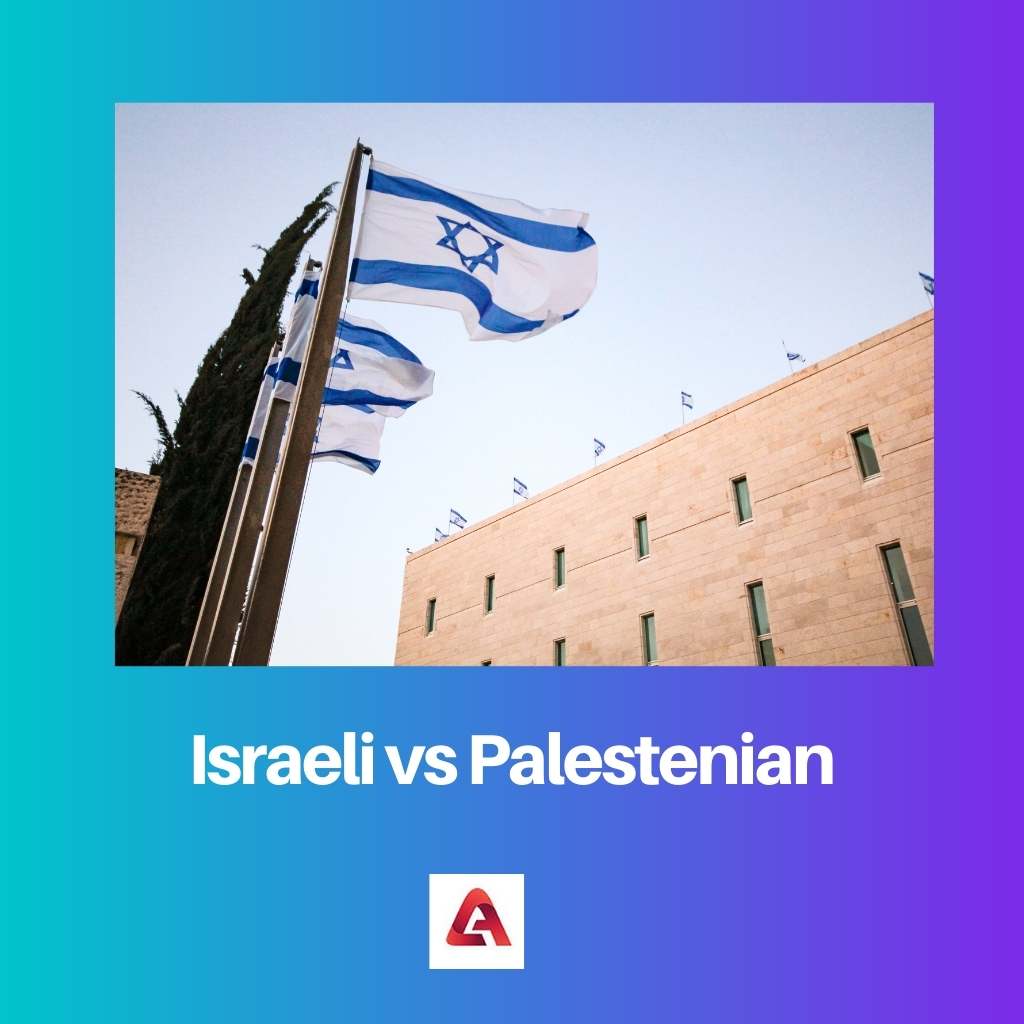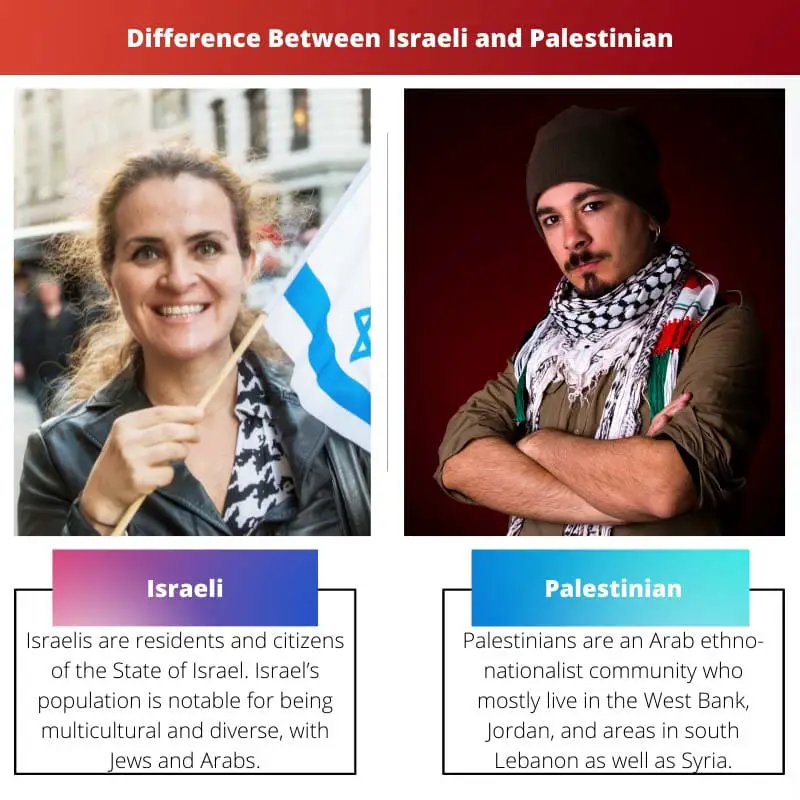Because of the impact of numerous immigrant communities, Israeli culture is mainly Western, whilst Palestinian culture is predominantly Arab.
Even though the same United Nations resolution established two nations, one Jewish and one Arab, the Palestinians have never truly exercised sovereignty over their country.
So, in order to better comprehend the disputes and the differences between the people of both countries, this article is here to assist.
Key Takeaways
- Israelis are citizens of the State of Israel, whereas Palestinians are an ethnic group primarily living in the West Bank and Gaza Strip.
- The Israeli government is a parliamentary democracy, while the Palestinian territories have a semi-autonomous government with limited control.
- The Israeli-Palestinian conflict arises from territorial disputes, religious differences, and historical grievances.
Israeli vs Palestenian
Israeli refers to a citizen of the State of Israel, and most of the Israelis are Jews, but Muslims, Christians, and Druze living in Israel are also called Israelis. Palestinians are an ethnic and national group mainly residing in the Palestinian territories of the West Bank and the Gaza Strip.

Israelis are residents and citizens of the State of Israel. Israel’s population is notable for being multicultural and diverse, with Jews and Arabs accounting for 75 percent and 20 percent of the total numeric population, respectively, followed by other minorities accounting for 5 percent of the nation’s population.
Palestinians are an Arab ethnic-nationalist community who mostly live in the West Bank, Jordan, and areas in south Lebanon as well as Syria.
Other nations with substantial Palestinian populations include Saudi Arabia and the United States, which has around 85,000 persons of Palestinian heritage, as per a 2013 U.S. Census number.
Comparison Table
| Parameters of Comparison | Israeli | Palestenian |
|---|---|---|
| Description | Israelis are residents and citizens of the State of Israel. Israel’s population is notable for being multicultural and diverse, with Jews and Arabs. | Palestinians are an Arab ethno-nationalist community who mostly live in the West Bank, Jordan, and areas in south Lebanon as well as Syria. |
| Majority | The majority of Israelis are Jews. | The majority of Palestinians are Sunni Muslims. |
| Place | They belong to the country; Israel. Later immigrants from Ethiopia, the ex Soviet Union, as well as the Americas contributed new cultural aspects to Israeli civilization. | Palestinian people constituted 49 percent of all residents in this combined share of territory, including the overall population of the Gaza Strip, the maximum of the population of the West Bank, and nearly 21 percent of people of Israel proper as Arab residents of Israel. |
| Development | Developed and continues to develop in the new era. | The place is Stateless. |
| Culture | Israelis follow westernized culture and are very forward in the entire globe. | Palestinians adhere to Arabic culture. |
What is Israeli?
During the late nineteenth and early twentieth century, large Minority migration to British Palestine was predominantly characterized by Jewish expatriate populations from Europe, West Asia, and Northern Africa.
Later immigrants from Ethiopia, the ex-Soviet Union, and the Americas contributed new cultural aspects to Israeli civilization and had a significant effect on present Israeli society.
Israelis and folks of Israeli descendants have a significant immigrant population, and it is estimated that nearly 10% of the overall Israeli citizens live abroad, primarily in Russia (with Moscow sheltering the single largest Israeli congregation from outside Israel), India, the UK, the USA, etc.
According to the Israel Central Statistics Office, the Israeli population was around 7 million in 2009-2010.
The Palestinian population is expected to be 9.6 million, with more than half of those living as unregistered refugees in nations around the Middle East, Europe, and Africa.
The remainder of them is in Palestine. The Palestinian data are from the Palestinian Central Bureau of Statistics.
All Israelis are immigrants or relatives of migrants who have relocated to the territory during the previous two centuries, whereas Palestinians are successors of those who have lived in Palestine, which consists mostly of the Occupied Territories.

What is Palestenian?
Palestinian Arab residents of Israel, the bulk of whom are derived from Palestinians who stayed in the nation just after the 1948 war, account for approximately one-fifth of the overall Israeli community.
Since they are commonly referred to as Arab-Israelis to separate themselves from Palestinians living in the West Bank and Gaza, many more firmly connect with the Palestinian people and believe that the name “Arab-Israeli” is a misconception.
“We are Palestinians by ethnicity and Israeli residents,” remarked Ahmad Tibi, an Arab speaker of Israel’s Knesset, in a 2k19 statement.
The connection between Palestinian Israelis as well as the state is complicated and tense, with several Palestinian Israelis thinking that the government unfairly targets them in specific ways.
Nonetheless, polls consistently show that the majority of Israelis would choose to stay Israeli citizens rather than embrace citizenship in a future State of Palestine.
Despite many wars and exodus (such as the one in 1948), nearly one-half of the globe’s Palestinian people still live in ancient Palestine, including the West Bank, Gaza, and Israel.
As of 2005, Palestinian people constituted 49 percent of all residents in this combined share of territory, including the overall population of the Gaza Strip, the maximum of the population of the West Bank, and nearly 21 percent of the people of Israel proper as Arab residents of Israel.

Main Differences Between Israeli and Palestenian
- Israelis are actually the people who reside in Israel, whereas Palestinians are descended from ancestors living in Palestine before 1947.
- The majority of Israelis are Jews, while the majority of Palestinians are Sunni Muslims.
- Israelis are primarily immigrants, whereas Palestinians are native descendants.
- The majority of Israelis adhere to Western culture, whilst the majority of Palestinians adhere to Arabic culture.
- Israelis are citizens of a developed country, whilst Palestinians are stateless.

- https://www.cfr.org/global-conflict-tracker/conflict/israeli-palestinian-conflict
- https://www.vox.com/2018/11/20/18079996/israel-palestine-conflict-guide-explainer

It’s not like Israelis are entirely immigrants; it’s more complex than that. But this article definitely sums up the situation well.
Could be, but it’s a conflict of identity and land tenure.
I think the point the article is making is that Palestinians have been there for generations and Israelis have mostly come from abroad in the past couple of centuries.
The situation is so dire, yet this article gives some hope. Peace is achieved with knowledge and cultural understanding.
I am inclined to agree.
It really is dire, but we should keep hoping.
The conflict might not seem resolvable, but understanding each side is the first step to any solution.
I agree completely. Knowledge is the path to peace.
I don’t see much hope for peace when the Israeli government is so powerful and the Palestinians have so little control.
I’m a bit discouraged that this situation seems unsolvable, but it’s an incredibly complex issue and we should keep working on it, as the article suggests.
Why is this still an issue in 2023? It’s ridiculous.